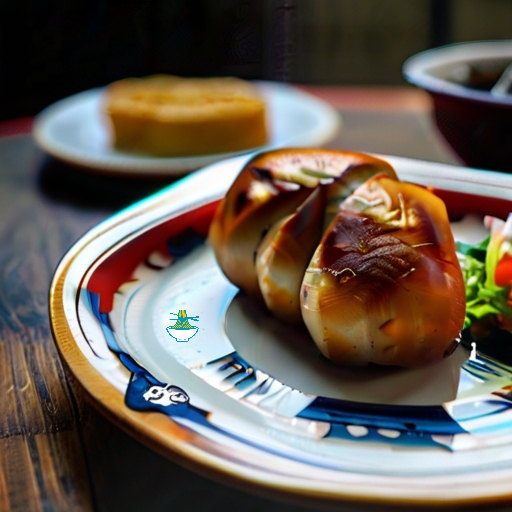Description: Embark on a culinary journey to the rugged landscapes of the Faroe Islands with our immersive exploration of Breyðmatur, the traditional cuisine that reflects the rich cultural heritage of this North Atlantic archipelago. From hearty stews to freshly caught seafood delicacies, experience the authentic flavors and culinary techniques passed down through generations. Discover the unique ingredients sourced from the land and sea, as well as the cultural significance behind each dish. Join us as we delve into the essence of Faroese gastronomy with Breyðmatur, where every bite tells a story of resilience, tradition, and the natural beauty of the Faroe Islands.
Ingredients:
For the bread:
- 3 cups whole wheat flour
- 1 cup all-purpose flour
- 2 teaspoons active dry yeast
- 1 teaspoon salt
- 1 ½ cups lukewarm water
- 1 tablespoon honey
- 2 tablespoons melted butter
For the fish (or meat) topping:
- 1 lb fresh Faroese fish (such as cod or salmon), thinly sliced (or substitute with lamb or beef)
- 2 tablespoons butter
- 1 onion, finely chopped
- 2 cloves garlic, minced
- Salt and pepper to taste
- Fresh herbs (such as dill or parsley), for garnish
Instructions:
Prepare the bread:
1-In a large mixing bowl, combine the whole wheat flour, all-purpose flour, yeast, and salt.
2-In a separate bowl, mix together the lukewarm water, honey, and melted butter.
3- Gradually add the wet ingredients to the dry ingredients, stirring until a dough forms.
4- Knead the dough on a floured surface for about 5-7 minutes until smooth and elastic.
5- Place the dough in a greased bowl, cover with a clean kitchen towel, and let it rise in a warm place for about 1 hour or until doubled in size.
6- Preheat the oven to 375°F (190°C).
7- Punch down the risen dough and shape it into a round loaf. Place it on a baking sheet lined with parchment paper.
8- Bake the bread for 25-30 minutes or until golden brown and sounds hollow when tapped on the bottom. Let it cool on a wire rack.
Prepare the fish (or meat) topping:
1- In a skillet, melt the butter over medium heat.
2- Add the chopped onion and garlic, sautéing until softened and fragrant.
3- Add the thinly sliced fish (or meat) to the skillet, season with salt and pepper, and cook until cooked through, about 5-7 minutes for fish or longer for meat.
4- Remove from heat and set aside.
Serve:
1- Slice the cooled bread into thick slices and arrange on a serving platter.
2- Top each slice with the cooked fish (or meat) mixture.
3- Garnish with fresh herbs and serve warm.
Enjoy your Faroe Islands Breyðmatur, a comforting and hearty traditional meal that celebrates the flavors of the Faroe Islands!
Nutritional Values:
Whole wheat flour (3 cups):
- Calories: 1080
- Protein: 39g
- Carbohydrates: 228g
- Fat: 6g
- Fiber: 30g
benefits: Rich in fiber, vitamins, and minerals, whole wheat flour promotes digestive health, helps regulate blood sugar levels, and provides sustained energy. It also contains antioxidants and nutrients like iron and magnesium.
All-purpose flour (1 cup):
- Calories: 455
- Protein: 12g
- Carbohydrates: 95g
- Fat: 1g
- Fiber: 3g
benefits: While not as nutrient-dense as whole wheat flour, all-purpose flour serves as a source of carbohydrates for energy and can be enriched with vitamins and minerals like folate and iron.
Active dry yeast (2 teaspoons):
- Calories: 15
- Protein: 2g
- Carbohydrates: 3g
- Fat: 0g
- Fiber: 1g
benefits: Yeast is a source of protein and B vitamins. In baking, it acts as a leavening agent, helping dough rise and giving bread its airy texture.
Salt (1 teaspoon):
- Calories: 0
- Protein: 0g
- Carbohydrates: 0g
- Fat: 0g
benefits: Salt is essential for maintaining fluid balance and nerve function in the body. It also enhances the flavor of food.
Water (1 ½ cups):
- Calories: 0
- Protein: 0g
- Carbohydrates: 0g
- Fat: 0g
benefits: Hydration is vital for overall health, and water is essential for numerous bodily functions, including digestion, temperature regulation, and nutrient transport.
Honey (1 tablespoon):
- Calories: 64
- Protein: 0g
- Carbohydrates: 17g
- Fat: 0g
- Fiber: 0g
benefits: Honey is a natural sweetener that contains antioxidants and may have antibacterial properties. It provides quick energy and can soothe sore throats and coughs.
Butter (2 tablespoons):
- Calories: 204
- Protein: 0.2g
- Carbohydrates: 0.2g
- Fat: 23g
- Fiber: 0g
benefits: Butter is a source of fat-soluble vitamins like A, D, E, and K. It adds richness and flavor to dishes and provides energy.
Fresh Faroese fish (1 lb):
- Calories: 400-600 (depending on type)
- Protein: 75-100g (depending on type)
- Carbohydrates: 0g
- Fat: 5-25g (depending on type)
- Fiber: 0g
benefits: Fish is an excellent source of high-quality protein, omega-3 fatty acids, and various vitamins and minerals like vitamin D and selenium. It supports heart health, brain function, and overall well-being.
Onion (1 medium):
- Calories: 44
- Protein: 1g
- Carbohydrates: 10g
- Fat: 0g
- Fiber: 2g
benefits: Onions are low in calories but high in antioxidants, vitamins, and minerals. They contain compounds that may reduce inflammation, improve heart health, and boost immune function.
Garlic (2 cloves):
- Calories: 8
- Protein: 0.4g
- Carbohydrates: 1.8g
- Fat: 0g
- Fiber: 0.1g
benefits: Garlic is known for its potential health benefits, including boosting the immune system, lowering blood pressure, and reducing the risk of heart disease. It contains sulfur compounds with potent medicinal properties.
Nutritional values may vary depending on factors such as brand, specific type of ingredient, and cooking methods. These values are approximate and should be used as a general guideline.


Comments